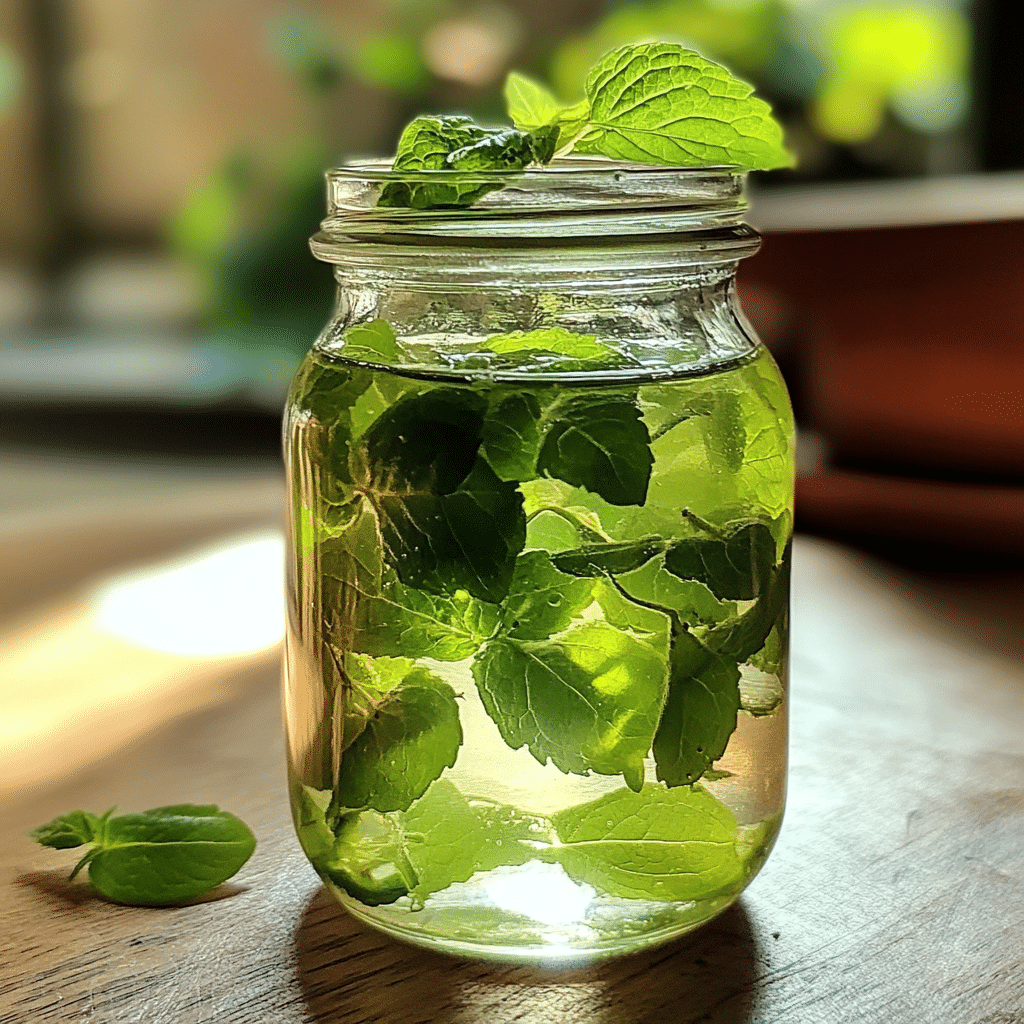Looking to calm your mind, soothe digestion, or get a restful night’s sleep—naturally? A lemon balm tincture might be exactly what you need. Made from Melissa officinalis, this herbal remedy has been cherished for centuries for its gentle yet effective calming properties. In this guide, we’ll explore everything from the benefits and dosage to how to make your own lemon balm tincture at home—including alcohol-free options.
Check out our Lemon Balm Tea Recipe for another delightful way to enjoy this soothing herb.
Table of Contents
ToggleWhat is Lemon Balm Tincture?
The herbal origins of lemon balm tincture (Melissa officinalis)
Lemon balm tincture , known scientifically as Melissa officinalis, is a lemon-scented herb that’s part of the mint family. Native to Europe and the Mediterranean, this humble plant has been used since medieval times to ease stress, promote sleep, and even support cognitive health. It’s loaded with natural compounds like rosmarinic acid and flavonoids, which are believed to contribute to its calming and antioxidant effects.
For centuries, people have turned to lemon balm tincture not only for its delicate citrus aroma but also for its ability to soothe nerves and uplift moods. Whether steeped in teas or crafted into potent extracts, lemon balm tincture remains a go-to for herbal enthusiasts seeking a natural way to manage everyday stress.
What makes a tincture different from tea or capsules?
A tincture is a concentrated liquid extract typically made by soaking herbs in alcohol or another solvent, which pulls out the beneficial compounds. This differs from teas, where you’re only steeping the leaves in hot water for a short period, extracting mainly water-soluble compounds. Capsules often contain powdered dried herbs, which take longer for the body to digest and may deliver less immediate effects.
Here’s a quick table comparing these forms:
| Form | How it’s made | Best use case |
|---|---|---|
| Tincture | Herb steeped in alcohol | Fast absorption, versatile |
| Tea | Herb steeped in hot water | Gentle daily use, hydration |
| Capsules or tablets | Powdered dried herb in caps | Easy dosing, travel-friendly |
Because tinctures are so concentrated, they’re often taken in small dropperful doses. They can be added to water, tea, or taken straight under the tongue for rapid absorption—making them a favorite for anyone seeking quick relief from stress or digestive upset.
Print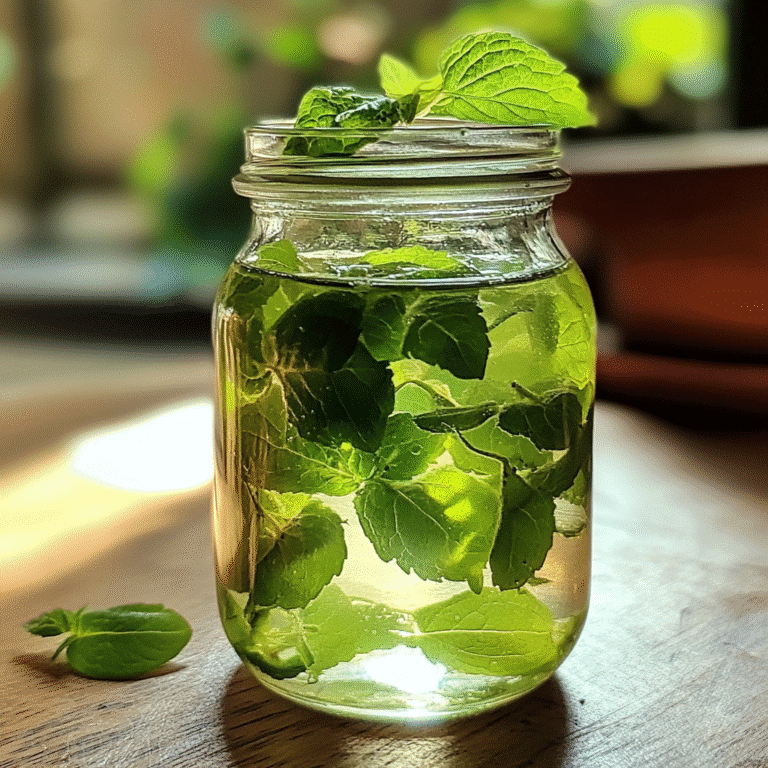
Lemon Balm Tincture
5 Stars 4 Stars 3 Stars 2 Stars 1 Star
No reviews
A soothing herbal tincture made from lemon balm (Melissa officinalis), perfect for stress relief, digestion support, and restful sleep.
- Total Time: 10 minutes active, 4-6 weeks steeping
- Yield: About 8 ounces tincture
Ingredients
Fresh or dried lemon balm leaves
High-proof alcohol (vodka or brandy), at least 80 proof
Glass jar with tight-fitting lid
Fine mesh strainer or cheesecloth
Dark glass dropper bottles
(Optional for alcohol-free): Vegetable glycerin or apple cider vinegar
Instructions
1. Rinse fresh lemon balm leaves and pat dry; skip this step if using dried.
2. Loosely pack a clean glass jar about halfway with lemon balm leaves.
3. Pour alcohol over the herbs until fully covered, leaving about 1 inch of space at the top.
4. Seal the jar tightly and label it with the date.
5. Store in a cool, dark place for at least 4 weeks, shaking gently once a day.
6. After steeping, strain through a cheesecloth or fine mesh strainer into a bowl.
7. Squeeze out any excess liquid from the herbs.
8. Transfer the tincture to dark glass dropper bottles and seal tightly.
9. Store in a cool, dark cabinet for up to 5 years.
10. For an alcohol-free version, replace alcohol with a mix of 3 parts vegetable glycerin to 1 part water, or use pure apple cider vinegar; store finished product in fridge for 6-12 months.
Notes
Start with a low dose, about ½ teaspoon (2-4 ml) up to three times daily, held under the tongue for 30 seconds before swallowing.
Mix into water, tea, or smoothies if preferred.
Consult your healthcare provider before use if pregnant, breastfeeding, managing thyroid conditions, or taking sedatives.
Keep alcohol-based tinctures stored in dark bottles in a cool, dark place for maximum potency.
Non-alcohol tinctures are best kept refrigerated and used within 6-12 months.
- Author: Jessica Lupone!
- Prep Time: 10 minutes
- Cook Time: 0 minutes
- Category: Herbal Remedies
- Method: Steeping
- Cuisine: Herbalism
- Diet: Vegan
Nutrition
- Serving Size: ½ teaspoon (2-4 ml)
- Calories: 0
- Sugar: 0g
- Sodium: 0mg
- Fat: 0g
- Saturated Fat: 0g
- Unsaturated Fat: 0g
- Trans Fat: 0g
- Carbohydrates: 0g
- Fiber: 0g
- Protein: 0g
- Cholesterol: 0mg
Health Benefits of Lemon Balm Tincture
Natural stress & anxiety relief properties
Feeling frazzled by a hectic day? Lemon balm tincture might be your new best friend. This herbal extract is well-known for its calming effects on the nervous system. Research suggests that compounds in lemon balm tincture interact with GABA receptors in the brain, which help regulate mood and promote a sense of calm.
A few drops under the tongue or mixed in water can help take the edge off without the drowsiness that often comes with pharmaceutical options. That’s why many people reach for lemon balm tincture during times of high stress, before important meetings, or simply when life feels overwhelming.
In fact, a study published in Phytotherapy Research found that lemon balm tincture significantly reduced anxiety levels and improved mood in participants after just a single dose. That’s a pretty compelling reason to keep this herbal remedy handy.
Digestive & sleep support backed by studies
Beyond easing stress, lemon balm tincture is a gentle yet effective ally for digestive health. Historically, herbalists have used lemon balm tincture to calm upset stomachs, reduce bloating, and even ease cramps. Modern research supports this, showing that lemon balm can help relax the smooth muscles of the gastrointestinal tract, making it easier to digest food and preventing discomfort.
And if tossing and turning at night is an all-too-familiar struggle, lemon balm tincture may help there, too. Combined with other calming herbs like valerian or chamomile, lemon balm is often used as a natural sleep aid. It doesn’t just knock you out; it promotes restful, quality sleep by calming the mind and body—helping you wake up refreshed instead of groggy.
Looking for inspiration? Try our Natural Zepbound Recipes for Weight Loss which also emphasize wholesome natural ingredients that support digestion and overall wellness.
How to Make Lemon Balm Tincture at Home
Ingredients & tools needed
Making your own lemon balm tincture is simpler than you might think—and it lets you control exactly what goes into your natural remedy. Here’s what you’ll need to get started:
- Fresh or dried lemon balm leaves: Fresh is ideal for maximum potency, but dried works too if that’s what you have.
- High-proof alcohol (like vodka or brandy): Aim for at least 80 proof (40% alcohol) to properly extract the beneficial compounds.
- Glass jar with tight-fitting lid: A mason jar works perfectly.
- Fine mesh strainer or cheesecloth: To strain the herbs after steeping.
- Dark glass dropper bottles: For storing the finished tincture and protecting it from light.
You can also keep a small label or piece of masking tape handy to note the date you started your tincture—this makes it easy to track how long it’s been steeping.
Step-by-step process (alcohol-based method)
1. Prep your lemon balm Tincture
Gently rinse fresh lemon balm tincture leaves to remove any dust or critters, then pat them dry with a towel. If you’re using dried lemon balm tincture, you’re all set to go.
2. Fill your jar
Loosely pack the jar about halfway with the lemon balm tincture. Don’t cram it in—herbs need room for the alcohol to circulate.
3. Pour in the alcohol
Completely cover the lemon balm tincture with your vodka or brandy, leaving about an inch at the top. Give it a little stir with a clean spoon to release any trapped air bubbles.
4. Label and store
Seal the jar tightly and mark it with the date. Then, store it in a cool, dark spot such as a cupboard. Shake it gently once a day to keep things moving.
5. Wait patiently
Let your tincture steep for at least 4 weeks. Some herbalists prefer up to 6 weeks for a stronger extract.
6. Strain and bottle
When time’s up, pour the contents through a cheesecloth or fine strainer into a clean bowl. Squeeze out as much liquid as possible from the herbs, then transfer the tincture to your dark glass dropper bottles.
Learn more about other gentle herbal preparations by checking out our Drying Lemon Balm Leaves for Tea, which pairs beautifully with homemade tinctures for a full herbal wellness toolkit.
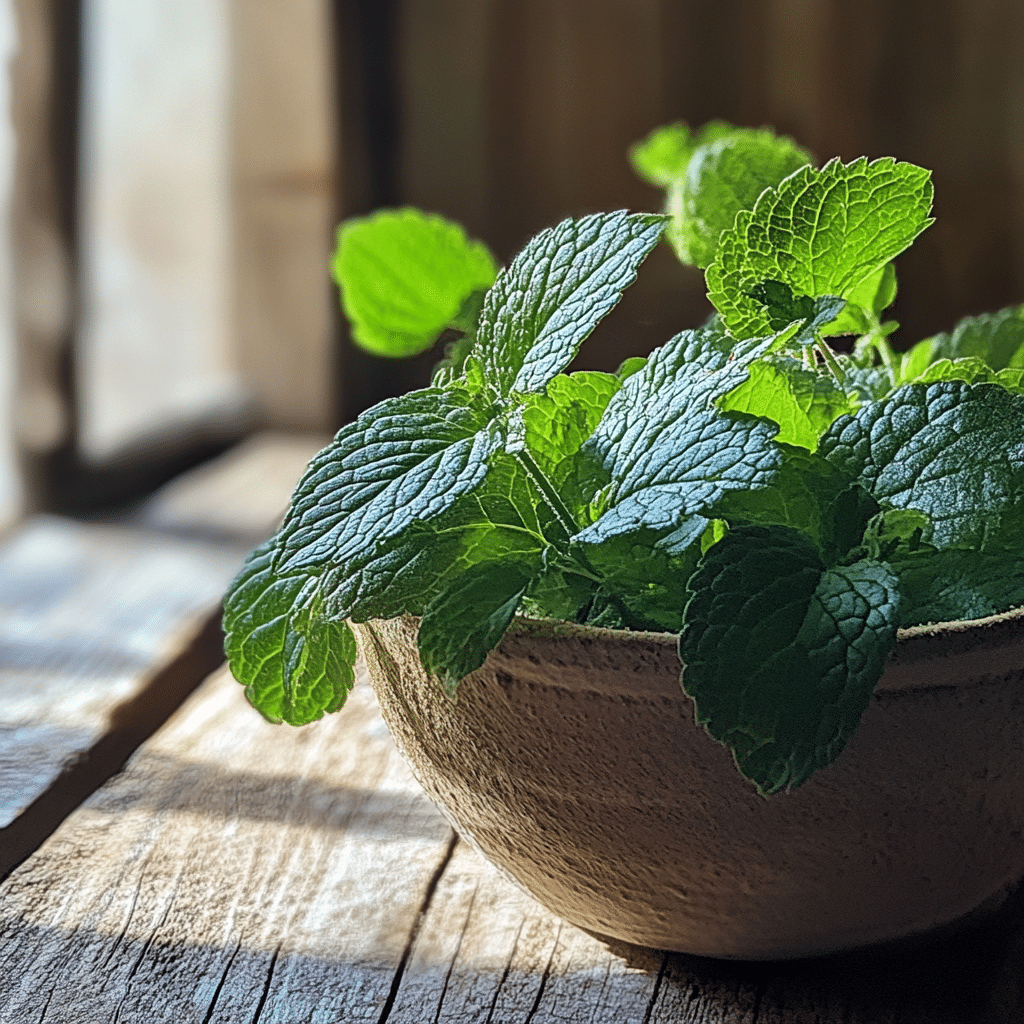
How to Make Lemon Balm Tincture Without Alcohol
Glycerin or vinegar alternatives explained
If you want to skip alcohol entirely—maybe for kids, pets, or personal preference—there are still great ways to extract the calming benefits of lemon balm. The two most popular alternatives are:
- Vegetable glycerin: A clear, sweet, plant-based liquid that’s gentle on the stomach. It’s commonly used to make “glycerites,” the alcohol-free cousin of tinctures. Glycerin extracts a slightly different profile of herbal constituents than alcohol but still does an excellent job with lemon balm’s relaxing compounds.
- Apple cider vinegar: An old-fashioned method that not only extracts helpful compounds but also adds gut-friendly benefits. Vinegar tinctures (technically called “acetums”) have a shorter shelf life but are ideal if you want an alcohol-free extract with added digestive perks.
Each method is mild and friendly to most palates, making them popular for families.
A simple non-alcoholic recipe to try
Ingredients & supplies
- Fresh or dried lemon balm leaves
- Vegetable glycerin or apple cider vinegar
- Clean glass jar with lid
- Fine strainer or cheesecloth
- Dark glass bottles for storage
Instructions
- Prepare your herbs: Rinse fresh lemon balm tincture and pat dry. If using dried, measure out your portion.
- Fill the jar: Loosely pack it about halfway with lemon balm tincture .
- Pour over glycerin or vinegar: Make sure all the herbs are submerged. For glycerites, use a mix of 3 parts glycerin to 1 part water to help with flow. Vinegar can be used straight.
- Label & steep: Write the date on the jar and store it in a cool, dark spot. Shake daily.
- Strain after 4 weeks: Use a fine mesh strainer or cheesecloth to filter out the plant material. Squeeze well to get every drop.
- Bottle & refrigerate: Non-alcohol tinctures are best kept in the fridge and typically last about 6-12 months.
Want more ways to support your health naturally? Learn more about the benefits of Lemon Balm for Weight Loss as another creative herbal approach.
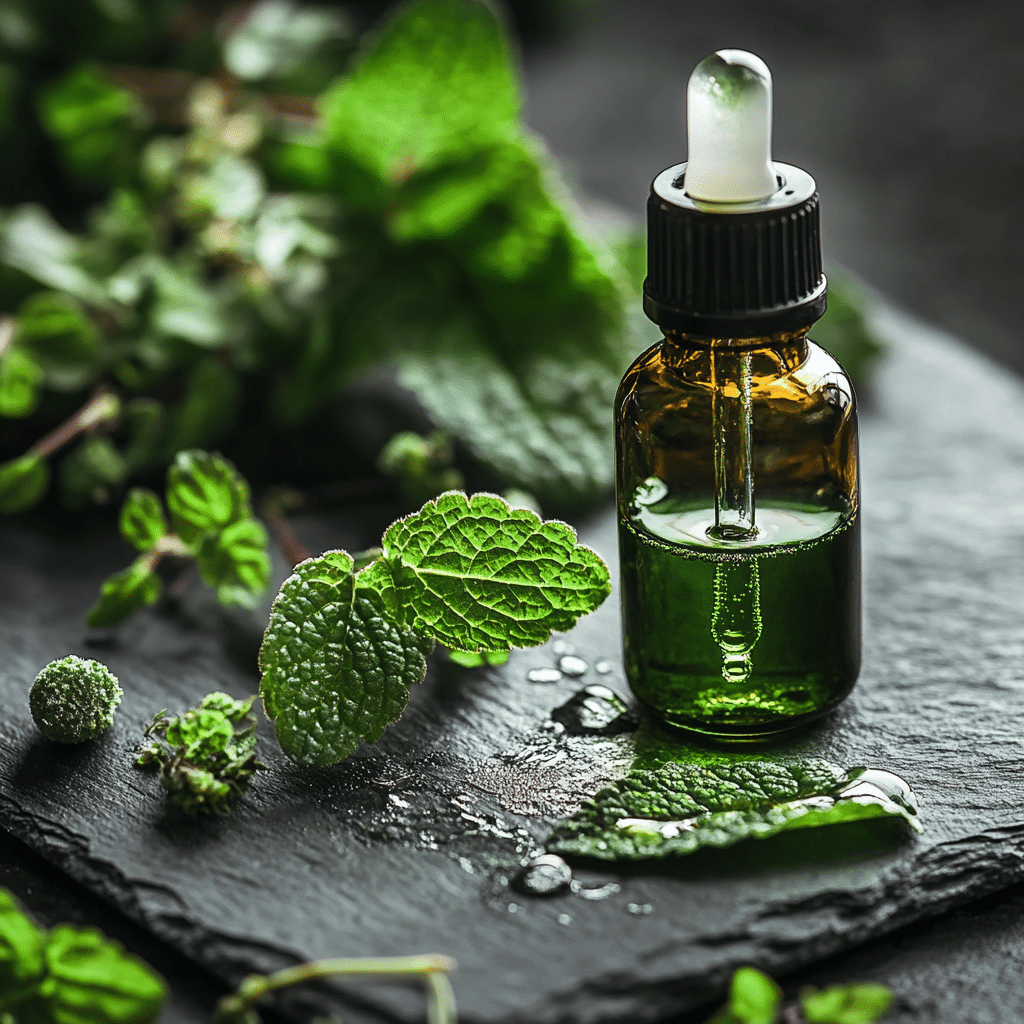
Dosage Guide: How Much Lemon Balm Tincture to Take
General adult dosage recommendations
When it comes to lemon balm tincture, dosing is both simple and flexible, which is one reason herbal enthusiasts love it. For most adults, the standard recommended dose is:
| Form | Typical Adult Dose | Frequency |
|---|---|---|
| Alcohol-based tincture | 2–4 ml (about ½ to 1 tsp) | Up to 3 times per day |
| Glycerite/vinegar form | Slightly higher: 3–5 ml | Up to 3 times per day |
Because tinctures are concentrated, they’re usually taken under the tongue for faster absorption, held for 30 seconds, then swallowed. If the strong taste puts you off, you can mix it into a small glass of water, herbal tea, or even juice.
For gentle daily support, many herbalists suggest starting on the lower end—say, ½ teaspoon once or twice daily—and seeing how your body responds before increasing.
Safety tips & when to consult a professional
While lemon balm is widely regarded as safe for most people, it’s still important to be mindful:
- If you’re pregnant, breastfeeding, or managing thyroid conditions, consult your healthcare provider first. Lemon balm can mildly affect thyroid hormone levels.
- Always watch for allergies, especially if you have a sensitivity to plants in the mint family.
- Don’t mix large amounts of lemon balm with sedatives without medical advice, as it can amplify drowsiness.
When trying new herbal supplements, it’s wise to start low and go slow—observe how your body feels over a few days and adjust as needed.
Want to complement your daily herbal routine? Learn more about our Organic Beetroot Juice Benefits Guide, another natural way to support vitality alongside lemon balm.
How to Use Lemon Balm Tincture in Daily Life
Adding to tea, smoothies, or under the tongue
One of the best things about a lemon balm tincture is its flexibility. You’re not locked into swallowing capsules or brewing a cup of tea each time. Here are simple, tasty ways to include it in your routine:
- Under the tongue: This is the fastest method. Just squeeze a dropperful under your tongue, hold it there for about 30 seconds, then swallow. This bypasses your digestive system and goes straight into the bloodstream for quicker effects.
- In tea or water: If the strong herbal taste is too much, simply drop your dose into a cup of herbal tea or a glass of water. The mild lemon-mint flavor of lemon balm pairs beautifully with chamomile or green tea.
- Blend into smoothies: Sneak your tincture into a morning green smoothie or a refreshing fruit blend. It’s an easy way to mask the taste while still getting all the benefits.
Creative culinary & beauty uses
If you enjoy getting a little crafty, tinctures open up even more possibilities:
- Homemade salad dressings: Add a few drops to vinaigrettes for a subtle herbal note that complements lemon or honey mustard dressings.
- Herbal skin toners: Dilute a small amount of lemon balm tincture in water and use it as a gentle face spritz (test first on a small patch of skin to make sure there’s no sensitivity).
- Bedtime calming mocktail: Mix sparkling water with a dash of lemon juice, honey, and your lemon balm tincture for a soothing evening drink.
Don’t miss our Natural Zepbound Recipes for Weight Loss for more creative ways to integrate health-boosting ingredients into daily meals and snacks.
Storage & Shelf Life: How Long Does Lemon Balm Tincture Last?
Best practices to store tincture for potency
You’ve taken the time to make (or purchase) a quality lemon balm tincture, so you’ll want to store it properly to keep it effective for as long as possible.
Here’s how:
- Keep it in dark glass bottles: Amber or cobalt blue bottles protect your tincture from UV light, which can degrade the herbal compounds.
- Store in a cool, dark place: A kitchen cupboard away from your stove or a pantry is perfect. Heat and direct sunlight are the biggest enemies of tincture potency.
- Seal it tight: Always make sure the dropper top or cap is screwed on well to prevent evaporation and oxidation.
For non-alcohol versions (like glycerites or vinegars), refrigeration is strongly recommended. These are more prone to spoilage over time.
Signs your tincture has expired
Alcohol-based lemon balm tinctures have an impressive shelf life. When stored properly, they typically last 3 to 5 years. That’s thanks to alcohol’s natural preservative powers.
Non-alcohol tinctures—like those made with glycerin or vinegar—have a shorter life, usually 6 to 12 months.
Wondering if it’s still good? Here’s what to check:
| Indicator | Meaning |
|---|---|
| Smell is off | Musty, rancid, or sour smell = toss it |
| Color changed | Some darkening is normal, but drastic changes can be a warning |
| Mold or cloudiness | Clear sign to discard and make a fresh batch |
Looking for more natural ideas that stand the test of time? Check out our Japanese Mounjaro Recipe for a unique way to bring health-boosting traditions into your kitchen.
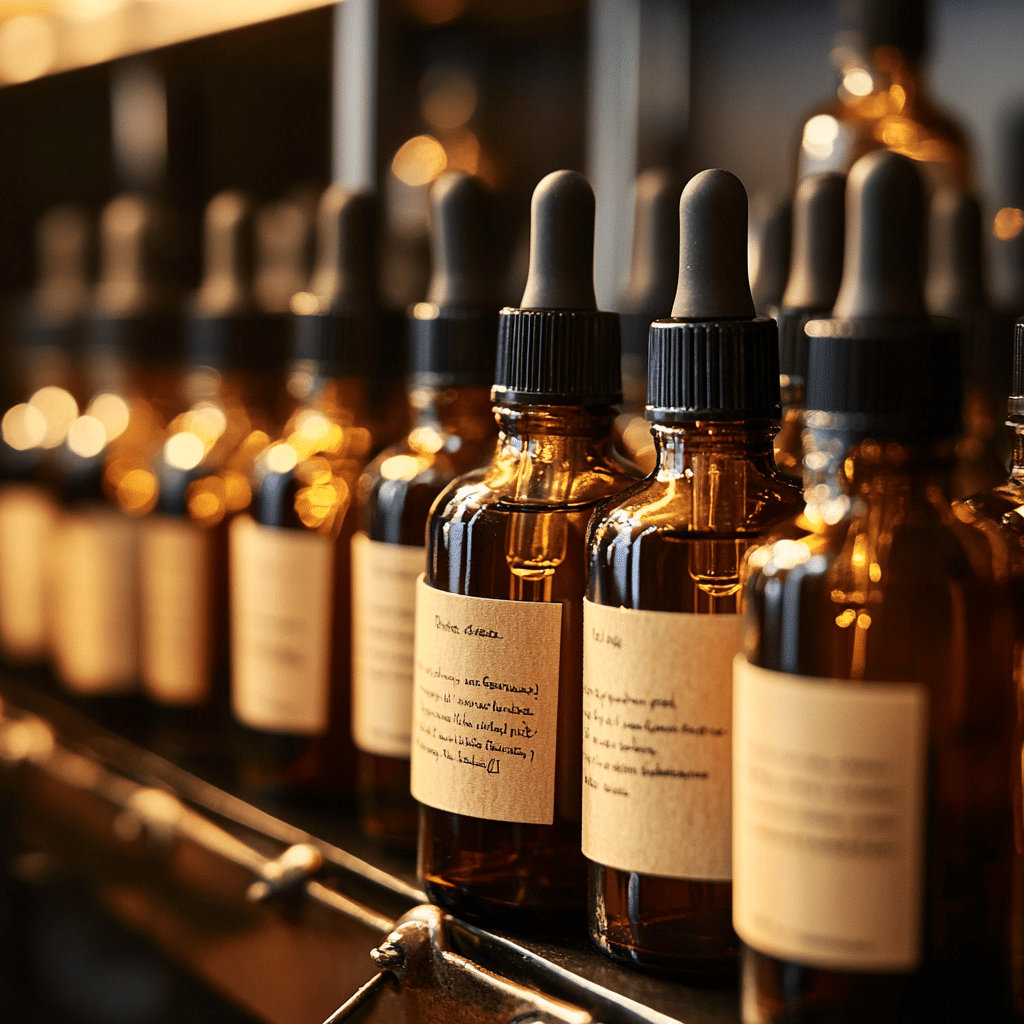
Common Questions About Lemon Balm Tincture
How does it taste and smell?
If you’re new to lemon balm tincture, you might wonder what you’re in for flavor-wise. Most people describe the taste as a lightly bitter, herbal note with hints of lemon and mint—thanks to the natural oils in lemon balm. When diluted in water or tea, it’s quite subtle and often pleasant.
The aroma is typically fresher and more inviting than the taste—think gentle lemon zest mixed with green mint leaves. That’s one reason why it pairs so well in calming evening teas or even homemade salad dressings.
Can kids or pets take lemon balm tincture?
Lemon balm is widely recognized as one of the gentlest herbs, but when it comes to kids or pets, you’ll want to adjust how it’s prepared and given:
- For children: Most herbalists recommend using a non-alcohol glycerite version and significantly lowering the dose. Always check with a pediatric herbal specialist or your family doctor first.
- For pets: Lemon balm can be calming for anxious dogs or cats, but again, avoid alcohol extracts and stick to minimal doses. Work with a holistic veterinarian to find the right approach for your pet’s weight and health status.
Don’t forget—just because something is natural doesn’t mean it’s automatically safe in every situation. Always consult with a knowledgeable professional when giving herbal remedies to children or animals.
Want more gentle herbal strategies? Discover great ideas like our Drying Lemon Balm Leaves for Tea, a simple way to harness the same soothing benefits without concentrates.
Conclusion: Embrace the Calm Power of Lemon Balm
Whether you’re looking to dial down daily stress, ease digestion, or finally get the restful sleep you deserve, a lemon balm tincture is a simple, natural way to support your well-being. With options ranging from classic alcohol-based extracts to gentle glycerites and vinegars, it’s easy to tailor this herbal remedy to suit your lifestyle.
Making your own tincture at home is not only budget-friendly but also gives you full control over quality and strength. Plus, it’s satisfying to craft your own natural medicine cabinet from the garden up.
Discover more wholesome ideas by checking out our Japanese Mounjaro Recipe for a unique twist on health-supportive culinary traditions.
For more recipes Follow me in our Social media
Facebook: https://www.facebook.com/profile.php?id=61573913076847
Pinterest: https://www.pinterest.com/momandgrandmacooks/
Medium: https://medium.com/@momandgrandmacooks
FAQs Answered in Detail
How long does lemon balm tincture last?
If stored correctly in a dark glass bottle, tightly sealed, and kept in a cool, dark spot, an alcohol-based lemon balm tincture will last up to 5 years. That’s one of the reasons tinctures are so popular—they have an impressive shelf life.
Non-alcoholic versions, like those made with glycerin or apple cider vinegar, are a bit more delicate. They generally stay fresh for 6 to 12 months, especially if stored in the refrigerator. Always check for signs like mold, cloudiness, or a musty smell before using.
How much lemon balm tincture to take?
For most adults, the typical dosage of a lemon balm tincture is 2–4 ml (about ½ to 1 teaspoon) up to three times a day.
If using a glycerite or vinegar extract, you might take slightly more—around 3–5 ml.
It’s best to start on the lower end to see how your body responds, especially if you’re new to herbal extracts.
Always consult with a healthcare provider if you’re pregnant, breastfeeding, have thyroid issues, or are taking other sedative-type medications.
How to use lemon balm tincture?
It’s incredibly easy and flexible to work into your daily routine:
Under the tongue (sublingual): For fast absorption, squeeze the dose under your tongue and hold it there for 30 seconds before swallowing.
In tea or water: Mix your tincture into herbal tea or a glass of water to mellow out the taste.
In smoothies or mocktails: Hide it in fruity blends for a tasty way to enjoy the benefits.
Many people use it morning or midday for stress support, and again in the evening to help wind down.

